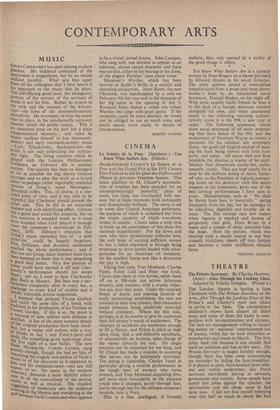CONTEMPORARY ARTS
MUSIC
SHURA CHERKASSKY is a sport among modern Pianists. His technical command of the instrument is magnificent, but by no means Without parallel. What sets him apart from all his colleagues that I have heard is his approach to the music that he plays. The self-effacing good taste, the abnegatory Posture of the servant of the servants of music is not for him. Rather he reverts to the style and the manner of the Klavier- I "ger—the lions of the nineteenth-century Pianoforte. He re-creates, re-lives the music that he plays, in the unashamedly extrovert manner which the public enjoys. This is 110 conscious pose on his part but a plain temperamental necessity ; and when he Wisely confines himself to late nineteenth- Century and early twentieth-century music —Liszt, Tchaikovsky, Rachmaninov—the result is not only enthralling but stylistic- ally right. The Grieg concerto which he Played with the London Philharmonic Orchestra on February 4th is another Matter. The fashion has been to disregard as far as possible the big, showy virtuoso Passages and to play the work as a lyrical suite—a perhaps rather regrettably extended version of Grieg's usual Norwegian- flavoured trifles. This, of course, is a one- sided point of view, and it was only to be expected that Cherkassy should present the Other side. This he did in no uncertain m, anner and with electrifying effect. Custom has a good deal staled this concerto, but on ,s`nts occasion it sounded much as it must from sounded when Liszt played it through lrom the composer's manuscript in Feb- ruary, 1870. Debussy's objection that Grieg's music reminded him of 'a pink Water-ice. could be happily forgotten. "re, brilliance, and dramatic excitement Marked the whole performance ; and if this was not Grieg, many listeners must have 'cell, tempted to think that it was something a good deal better. Very few pianists of today could have carried it off and Cher- kassky. 's performance should not tempt them; nor do I want to hear Cherkassky Play Each or Mozart. But here was a per- completely alive in every bar, a challenge to every kind of routine and a wholly enjoyable artistic experience. I suPpose that perhaps Tyrone Guthrie had much the same idea of a break with traditiCo on in his production of La Traviata at Covent Garden. If this is so, the result is viarMng of how seldom such defiance is Joufstified. A few of the more tasteless details the original production have been modi- , but a waiter still, waltzes with a tray ,of drinks in Act 1 and Flora's party still look s like something given back-stage after ,first night of a new ballet. The new „WISs Marguerite, .Colette Lorand, sang kientvt eilyY egnough, though she had no idea of in the tragedy and pathos of Verdi's „tosic or of the character as it appeared to ni and apPear his contemporaries—and can still rgert .0 us.. No opera- in the modern orY demands a more faithful adher- cell. to all the conventions of the period, 1c as well as musical. The smallest ..uggestion of modernity sets the audience tatert to be a trivial, unreal drama. John Lanigan, who sang well, was allowed to appear as an informal, almost casual character and there was no hint, either in his bearing or his dress, of the elegant Parisian `man about town.'
Massenet's Werther, which has been revived at Sadler's Wells, is a careful and charming production. Janet Howe, the new Charlotte, was handicapped by a cold on February 9th but rose well to the demands of her big scene at the opening of Act 3. Rowland Jones makes a rather too robust Werther but sings with great gusto. If the orchestra could be more discreet, he would not be obliged to use so much voice and could attend more easily to details of interpretation.
MARTIN COOPER


































 Previous page
Previous page